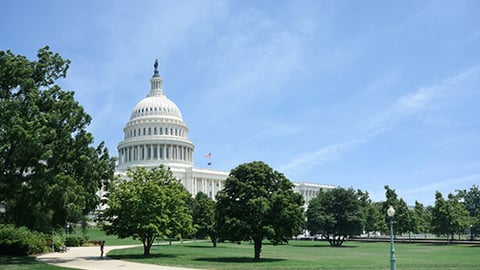Will Swipe Fee Reform Finally Get Passed?
OPINION: EDITOR'S NOTE
Whether you’re walking the halls of Capitol Hill or the aisles of the grocery industry’s biggest trade shows, the one topic of conversation that frequently bubbles up this year — after labor shortages and omnichannel optimization — is that of credit card swipe fees.
Grocery retailers, trade groups and politicians have lobbied for credit card swipe fee reform for decades, but now it seems as though there might be enough bipartisan political will to get it done.
In June, Congress reintroduced the bipartisan Credit Card Competition Act, reform first drafted last year that would require more than one network to be enabled on credit cards, giving food retailers choice in payment routing and fostering competitive innovations in services such as fraud protection for merchants and consumers alike.
“Due to a lack of competition, credit card companies have been able to exponentially increase hidden processing fees that grocers are forced to pay for accepting credit cards as payment. Card-processing fees in the U.S. are some of the highest in the world, totaling $160.7 billion in 2022, according to Nielson Report,” said FMI Chief Public Policy Officer and SVP, Government Relations Jennifer Hatcher. “Excessively high credit swipe fees that exceed grocers’ profit margins force grocers to have to increase prices. These fee increases disproportionately impact lower-income Americans, those who rely on cash and those who do not have access to high credit card rewards.”
Healthy Competition
Under current practices, Visa and Mastercard — which control 80% of the market — centrally price-fix the swipe fees charged by banks that issue their credit cards rather than the banks competing to offer merchants the lowest rates, according to the National Retail Federation (NRF). They also block competition by restricting the processing of transactions to their own networks. Visa and Mastercard imposed a $1.2 billion increase in credit card swipe fees in 2022.
The new legislation would require that the nation’s largest banks enable credit cards to be processed over at least two unaffiliated networks so that networks would have to compete over fees, service and security, with payments consulting firm CMSPI estimating that retailers and their customers would save at least $11 billion a year.
By making networks compete, NRF said, the legislation “will make a huge difference in bringing these fees under control and will strengthen the security and reliability of the credit card system at the same time.”
These days, with inflation easing but still high, grocers get a lot of bad press. A recent article in Bon Appetit magazine asked, “Why are grocery prices so high in 2023?” and attempted to blame it on a toxic concoction of inflation, corporate greed and climate change. The article even described a new phenomenon — “The Supermarket Scaries” — in which consumers are back to being afraid of going to the grocery store. This time, though, it’s not fear of catching a deadly virus, but of being unable to afford higher grocery prices.
The reason for higher grocery prices is extremely complex, but certainly one factor is large increases in credit card swipe fees. According to the Merchants Payments Coalition, credit and debit card swipe fees cost the average household an estimated $1,024 in higher prices in 2022, the first time the number has topped the $1,000 mark. Now that’s something to be scared about, especially if you’re a grocer. That’s why Congress should act swiftly to pass credit card swipe fee reform.






